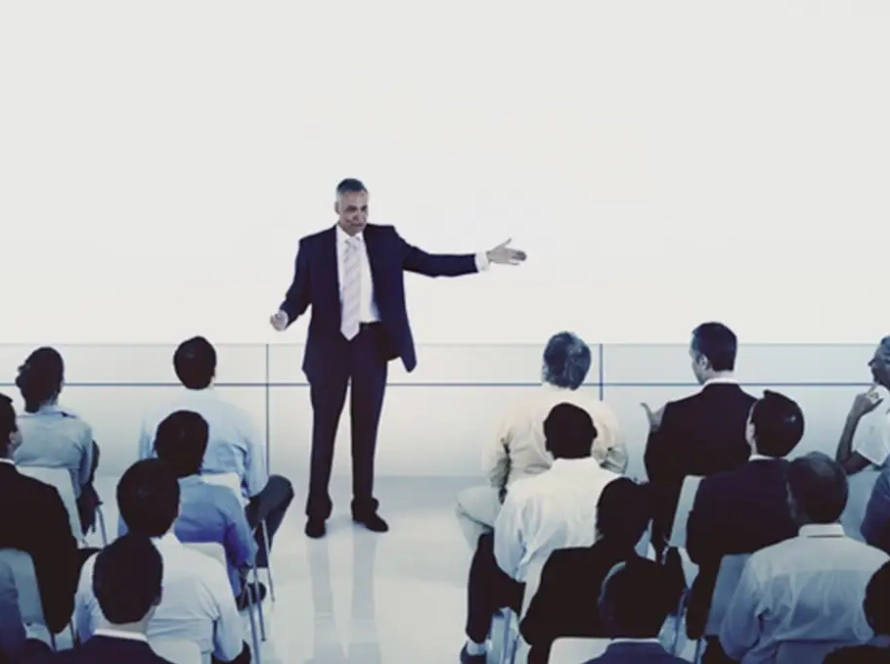Have you refused the opportunity of presenting something on-stage, hated presentations, and had weird physical reactions like dizziness and weak knees on stage?
If yes, you are on the right page. Here, we will be discussing how to overcome stage fright in public speaking.
What is Stage fright?
The fear of speaking publicly or appearing on stage for any performance is called stage fright or performance anxiety. People who have stage fright usually freeze, fumble excessively and even experience extreme physical weakness while on stage. Weak knees, anxiety, sweating, etc., are all our body’s responses to stage fright.
From children to seasoned professionals, a whole lot of people experience this fear and may give up important opportunities just to avoid facing it. Due to the stigma related to this topic, people do not find it comfortable to consult professionals regarding this fear. However, if you learn public speaking presentation skills from the appropriate trainers, you can overcome this issue.
Many people have this fear of speaking publicly for various reasons. Here are some reasons why people are so afraid of public speaking:
- Low confidence
- Low self-esteem
- Fear of rejection or embarrassment
- Generally shy and introverted nature
- Underestimation of oneself
- Unnecessary contemplation of reaction
- Anxiety issues
Stages of dealing with stage fright.
As mentioned above, there are various reasons why one can experience stage fright. However, all of these things can be overcome with proper help and public speaking presentation skills training.
Dealing with any fear requires a lot of courage and patience as well. In this resolution process, one mainly goes through 3 broad stages. They are as follows:
- Acceptance:
To be able to resolve any issue, one first needs to accept it and be comfortable with it. As the saying goes, you cannot solve a problem by running away from it. You need to sit face-to-face with the problem and understand it. In a similar manner, when one accepts the fact that he or she has stage fright and realizes that there is nothing wrong with it, working on it becomes easier.
- Analysis:
Once comfort and awareness are established, it is time to analyze the issue and try finding alternative solutions for it. This stage of learning how to overcome stage fright in public speaking is longer than the other two since the person comes face-to-face with the issue here. Various alternative solutions are tested, and if they do not work, other solutions are found. However, it is important to remember that the solution that works for one person may not work for the other. Hence, patience and persistence are essential in this process.
- Resolution:
After trying various methods, the person finds the combination of techniques that works for him or her. This method is then put into practice and can be evaluated from time to time. This process is more of a journey than a destination. Once you have found what works for you, you start striving to make it even better. Coming up with new techniques, constant introspection, etc., helps the speaker to find better approaches and progress while performing.
How to overcome stage fright in public speaking?
Overcoming stage fright is an important thing. Not just for people who are related to public speaking but for anyone who wishes to be heard and noticed. Without speaking up and putting forth your opinion, it will be very difficult for you to make your voice heard and stand out.
If you wish to avoid this, there are some small yet significant techniques that you can follow to overcome the last-minute nerves. However, if you really wish to make sustainable progress in public speaking, you can consult coaches who specialize in public speaking presentation skills.
Apart from consistent efforts and practice, here are some other tips to help you:
- Breathing techniques:
Anxiety, nervousness, uneven breathing, chills, etc., happen to the best of us before a presentation. These physiological responses to one’s stress can be tackled by regulating your breathing. One of the most widely used breathing exercises is deep and slow breathing.
When the performance is around 15 minutes away, go away from the crowd and close your eyes. Once your breathing is at a relatively normal rate, count to ten and take deep breaths from your abdomen. This will help your mind relax and will regulate your breathing.
- Focus on your purpose:
Many people focus on the ‘Ifs’ and ‘buts’ of the performance rather than thinking positively about the opportunity. In these situations, it is important that one focuses on the purpose and motive of the presentation or speech. Think about why you are here and about the difference that you are about to make. If thinking about that may give you even more nervousness, think about how you have been practicing and working so hard for this. Trust yourself and make sure that you do not say or think anything negative about yourself.
- Stay hydrated:
Many times, people do not remember to drink water or eat something under the pressure of performing well. This is something that you will be warned about when you learn public speaking presentation skills. Ignoring the signs of hunger or thirst given by the body can cause fainting, dizziness, and many other problems.
- Be yourself:
If you are in your element, you always tend to perform better. Don’t try to imitate anyone or be like a certain speaker. Your audience is here to see how you do things your way. If you give them something they have already seen in some other performance, it defeats the whole purpose. Hence, make sure that you stay yourself.
- Drop the unrealistic expectations:
No performance or speech is ever perfect. Mistakes and flaws are going to be there in every performance. What matters is whether you choose to blame yourself and quit or work on your presentation and get better at it. Hence, don’t keep unrealistic expectations from yourself. After all, attempts make a person better, not just victories.
Conclusion:
Stage fright is a very common thing, and many of us go through it. However, learning how to overcome stage fright in public speaking can help one overcome this fear effectively. With expert guidance from seasoned professionals like Orator Academy, you can learn how to get rid of this fear easily.
They know how to train new as well as seasoned professionals. Hence, you can trust them to help you drive out the fear and bring in confidence.

